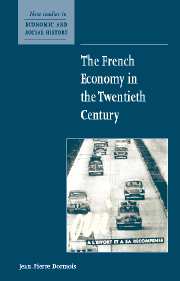Book contents
- Frontmatter
- Contents
- List of figures
- List of tables
- Preface
- List of acronyms
- 1 The end of French exceptionalism?
- 2 French economic performance in international perspective
- 3 France and the wider world
- 4 The changing face of Colbertism
- 5 The institutions of French capitalism
- 6 Labour: the French at work
- 7 Plough and pasture: lifeblood or drain?
- 8 Industrialisation, de-industrialisation, postindustrialisation
- Conclusion
- Glossary
- A national portrait gallery of twentieth-century France
- Bibliography
- Index
- Titles in the series
3 - France and the wider world
Published online by Cambridge University Press: 14 January 2010
- Frontmatter
- Contents
- List of figures
- List of tables
- Preface
- List of acronyms
- 1 The end of French exceptionalism?
- 2 French economic performance in international perspective
- 3 France and the wider world
- 4 The changing face of Colbertism
- 5 The institutions of French capitalism
- 6 Labour: the French at work
- 7 Plough and pasture: lifeblood or drain?
- 8 Industrialisation, de-industrialisation, postindustrialisation
- Conclusion
- Glossary
- A national portrait gallery of twentieth-century France
- Bibliography
- Index
- Titles in the series
Summary
The greater openness to and integration of a nation's economy with the rest of the world is widely regarded by economists as the key factor in optimal economic development and performance. The free flow of goods, ideas, labour and capital constitutes the means by which countries can exploit successfully the ever-changing international division of labour and develop the specialisation best suited to their resource endowment. Globalisation was launched when Europeans started to establish regular communications with other continents, from the sixteenth century onwards. It was given a decisive boost in the nineteenth century, when the capabilities of both production and transport were enhanced by the technology of the industrial revolution. Although devoid of any major European conflict, this century gave birth to nationalist ideologies which were to have far-reaching consequences. In Europe they spawned two destructive major wars which seriously disrupted the trend towards a more integrated world economy. These originated in Europe and were essentially fought on European soil. In both of them, France occupied centre stage.
Conversely, economic as well as political competition among European nation-states has always been a major feature of European history and may constitute a key to understanding the continent's precocious and continuing success (Rosenberg & Birdzell, 1984). But in the short term, the period from 1914 to 1945 (also referred to as Europe's twentieth-century ‘Thirty years’ war') has caused immense destruction, suffering and lost opportunities – despite the League of Nations' efforts to secure greater international co-operation.
- Type
- Chapter
- Information
- The French Economy in the Twentieth Century , pp. 27 - 42Publisher: Cambridge University PressPrint publication year: 2004

